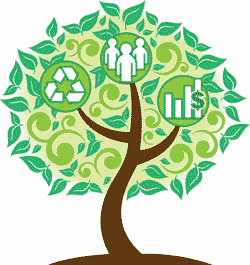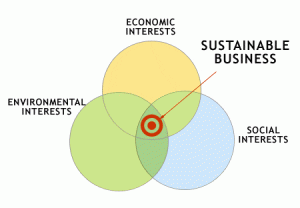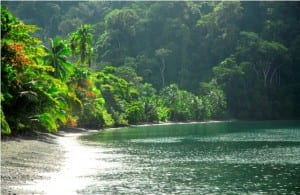What makes a sustainable business "sustainable" and why should we care?
Here's a news flash for you – we all live on the same planet Earth. In many ways we humans, and all of the living and non-living things and elements that exist on our planet, are connected. The dust storms in Africa that cause cloudy, windy, dry weather in Central America; the earthquake in Asia that causes a nuclear reactor to leak radioactive material into the world's largest ocean, affecting the fish we're eating for dinner in America; the business decisions made in a powerful country's boardroom that affect working conditions in a poorer nation; slashing and burning rainforests so we can have more timber, or drill for oil, or simply farm for food, and unexpectedly the world's weather goes haywire … and on and on. These are just a few examples of our interconnectedness.
 Operating a sustainable business means not only sustaining our own existence, but also ensuring that everything we involve and affect succeeds as well. This means not destroying the planet, or damaging people or society, in the pursuit of profit.
Operating a sustainable business means not only sustaining our own existence, but also ensuring that everything we involve and affect succeeds as well. This means not destroying the planet, or damaging people or society, in the pursuit of profit.
The United Nations defines sustainable development as "meeting the needs of the present without compromising the ability of future generations to meet their own needs." At the UN Global Compact Leaders Summit in New York in September, UN Secretary General Ban Ki-moon warned that "we cannot accept a rising tide that floats only some boats and leaves many to drown." Ban Ki-moon called on world business leaders to do even more along with the United Nations to promote sustainable development worldwide.
"Nobody can benefit from catastrophic climate change or rampant unemployment and the social unrest that comes with it," Ban Ki-moon said. "Prosperous, stable societies and a healthy planet are the bedrock of political stability, economic growth and flourishing new markets."
 In today's increasingly competitive landscape, more and more companies are realizing that being sustainable is more than an environmental gesture – it makes long-term economic sense for cost savings, consumer demand, resource limitations, and brand reputation and publicity, to name a few.
In today's increasingly competitive landscape, more and more companies are realizing that being sustainable is more than an environmental gesture – it makes long-term economic sense for cost savings, consumer demand, resource limitations, and brand reputation and publicity, to name a few.
Sustainable businesses in Costa Rica and internationally will take center stage at the upcoming Planet, People & Peace Ecotourism Conference in San Jose, Costa Rica. Organized by the Costa Rica National Chamber of Ecotourism and Sustainable Tourism (CANAECO), the conference will convene national and international leaders to share strategies, practices and experiences to help make tourism and businesses sustainable.
The 4th Planet, People & Peace (PPP or "P3") Ecotourism Conference will be held November 3-6 in San Jose at the National Auditorium at the Children's Museum, part of the Costa Rican Center of Science and Culture. Speakers and guests from 14 countries will meet to exchange ideas on the future of sustainable tourism and how to operate businesses in an environmentally responsible way.
Costa Rica has played an important role globally over the past decade in ecotourism and sustainable business. Many businesses in Costa Rica are already successfully incorporating sustainable practices, and will be on display during the PPP Conference.
Sustainable Tourism in Costa Rica
One of Costa Rica's outstanding examples of sustainable tourism is Playa Nicuesa Rainforest Lodge, an environmentally sensitive eco-lodge set on a 165-acre private preserve in the undeveloped Osa Peninsula/Golfo Dulce region of the country's South Pacific. The Playa Nicuesa Reserve borders the lush rainforest of the Piedras Blancas National Park, and fronts the pristine Pacific coastline of the Golfo Dulce.
 Playa Nicuesa Rainforest Lodge has received the highest rating for sustainability (Five Leaves) by the Costa Rican Tourism Board (ICT). The lodge embraces conservation and harmony with the natural environment and caters to travelers interested in ecotourism, nature, adventure and sports. A member of the prestigious Enchanting Hotels of Costa Rica, Playa Nicuesa Rainforest Lodge is affiliated with the Rainforest Alliance, the International Ecotourism Society, the Costa Rican National Chamber of Ecotourism, and Sustainable Travel International, among others.
Playa Nicuesa Rainforest Lodge has received the highest rating for sustainability (Five Leaves) by the Costa Rican Tourism Board (ICT). The lodge embraces conservation and harmony with the natural environment and caters to travelers interested in ecotourism, nature, adventure and sports. A member of the prestigious Enchanting Hotels of Costa Rica, Playa Nicuesa Rainforest Lodge is affiliated with the Rainforest Alliance, the International Ecotourism Society, the Costa Rican National Chamber of Ecotourism, and Sustainable Travel International, among others.
Article by Shannon Farley

No hay comentarios:
Publicar un comentario